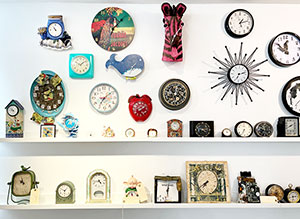 *
*
I recently caught up with artist/curator Bess Paupek. The objects of her affection are … well … objects.
Doug Holder: How has it been for you as an artist and curator living in Somerville?
Bess Paupek: I moved to Somerville just about 20 years ago when it was the perfectly located and inexpensive city near Boston and Cambridge. I would quickly discover so much more. At that time, and still, there were so many artists to meet and talk to and to make cool art happenings with, and I fell in love with this amazing city, where friends live and work around every corner. I only just recently moved a couple of miles down the road to East Arlington, but I’ve kept my studio and practice in Somerville and continue to draw deep inspiration from the people, stories and neighborhoods of Somerville.
DH: According to a press release from Somerville Open Studios you “create experiences out of objects, community and research.” Explain.
BP: I source my inspiration from the variety of ways I’ve been taught to see: some training as an artist, a curator, a museum professional and an academic, how I put things together is a fusion of all of these tools. As I constantly refine my art-making and curatorial practice, I find myself interested in building experiences for others based on the people and stories around me.
I am drawn most recently to people, their stuff, and their stories about their stuff. I imagine our homes as individual storage rooms for vast collections, the city a container for these worldly possessions. I think a lot about the choices people make in what objects they choose to keep near them. I am interested in considering nostalgia before monetary value, and celebrating and studying the impulse to keep and to collect.
All of this leads me to the model of community-curating that I’ve been digging into since around 2018. In this model, I don’t choose the objects to show. I don’t make any of the selections of the objects, purposely de-centering a curatorial voice. Instead, I put out a call to the community for loans of their “stuff” either open-ended or with a specific directive, and whatever I get, I must then turn into what I call an “exhibition installation” made up of the everyday stuff of the people in my community. I find this model leaves space for a more interesting vision to surface as I listen to the stories of these objects, and find ways that they fit together in the moment.
Most recently I put out a “call for time” in an effort to build what I called a community time machine. For this show, Borrowed Time, I was interested in examining the various ways people think about time, and how much of a healing space we could create for ourselves in this post-pandemic era, aka this period after which our sense of time was vastly shifted. Did we time travel in this time machine? I think so. There is a palpable amount of ancestral energy, history, and sense of time that these heirlooms, objects and stories bring to the surface. I do believe some sort of momentary time travel takes place in those moments where memory takes over and we forget where we are.
DH: You were a community curator for The Somerville Museum. Can you tell us about that experience?
BP: I was the Community Curator for the Somerville Museum during the first year of the community curator program, in the winter of 2019. It was a wonderful opportunity to make use of this incredible resource right in the center of our city. I am so grateful to the museum for including me in that wonderful program!
DH: What did you learn from the objects that Somerville residents contributed to your project?
BP: My Somerville Museum show Our Stories, Our Stuff, Our Somerville pulled together loans of the heirlooms and prized possessions of 85 residents of the city of Somerville, honoring the stories, individuals, families and ancestors within these objects. What became clear was how much amazing personal history lives within the objects in our households, and how easy it becomes for people to meet and connect when we share the stuff of our life stories. It was a special opportunity for residents to turn their homes inside out and let strangers see the things and hear the stories of what they cherish most. People found similarities in the objects they cherished and kept, and seeing these objects all together seemed to bring on a flood of memory.
I have since continued along the path of exploring domestic objects, and in my show Borrowed Time I simple asked people to “lend” me their time. In the end, some 53 people loaned me a wide variety of objects that mean time to them, from advent calendars to newspaper clippings, wall clocks and vintage travel clocks to kitchen timers, watches and old electric alarm clocks. This show was held at the gallery at Washington Street Art Center in Somerville, ticking, chiming and creating space for people to leave comments on their thoughts on time.
DH: Why should we view your work?
BP: It is my hope that the relevance of this work speaks for itself, directly to individuals, inviting them to find their own way toward participation, be it via loaning an object to a show or simply experiencing the communal energy of our stuff put together in a space. It is my hope that more and more individuals will learn about this work and participate, and continually to be able to find something of themselves in these gallery experiences I am so grateful to create.
Keep your eye out for the next show, which will most likely focus on clothing. Yep, I am putting it out there that I’m going to be asking folks to lend me objects of clothing. Stay tuned for more on that!















Reader Comments